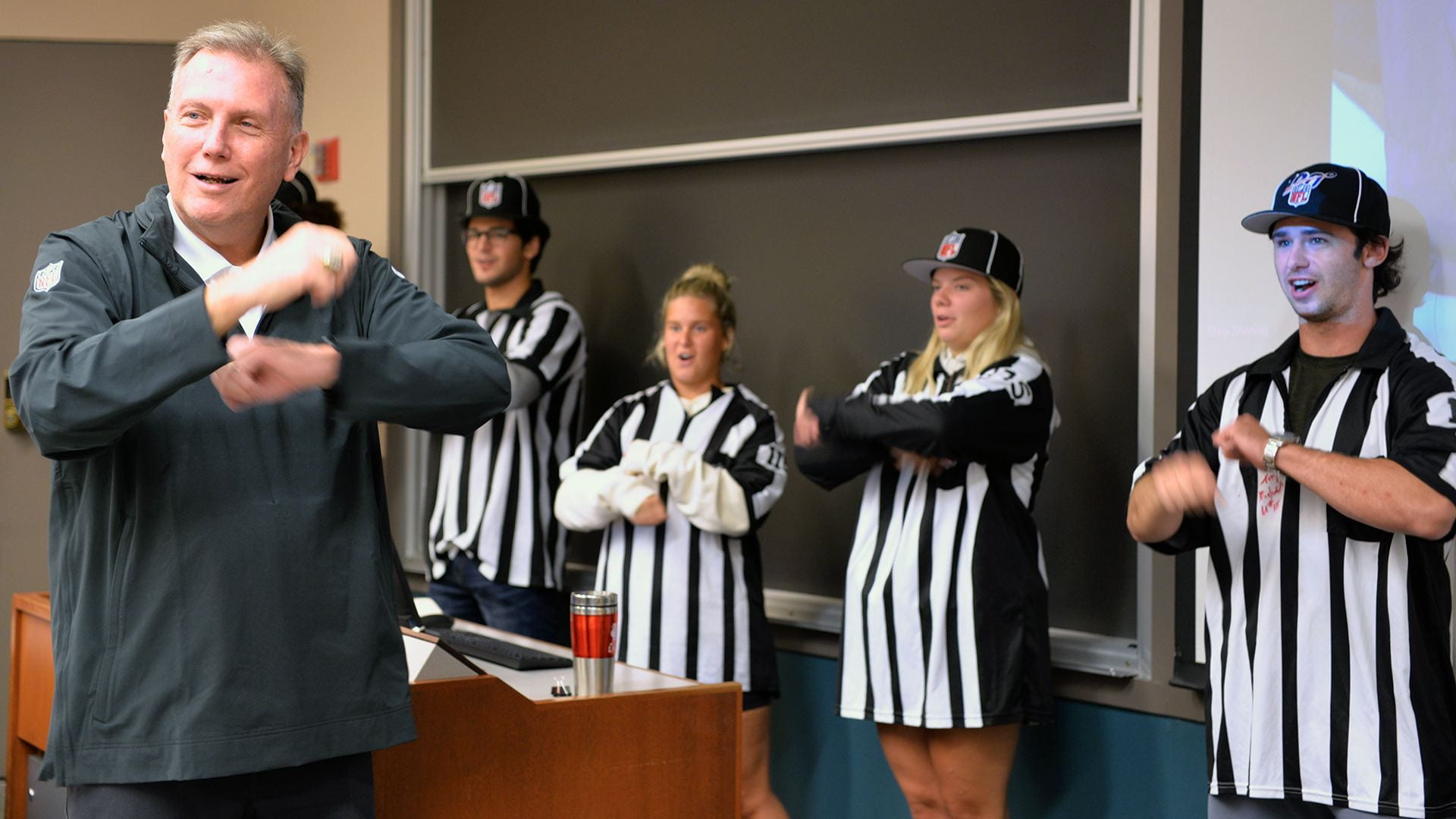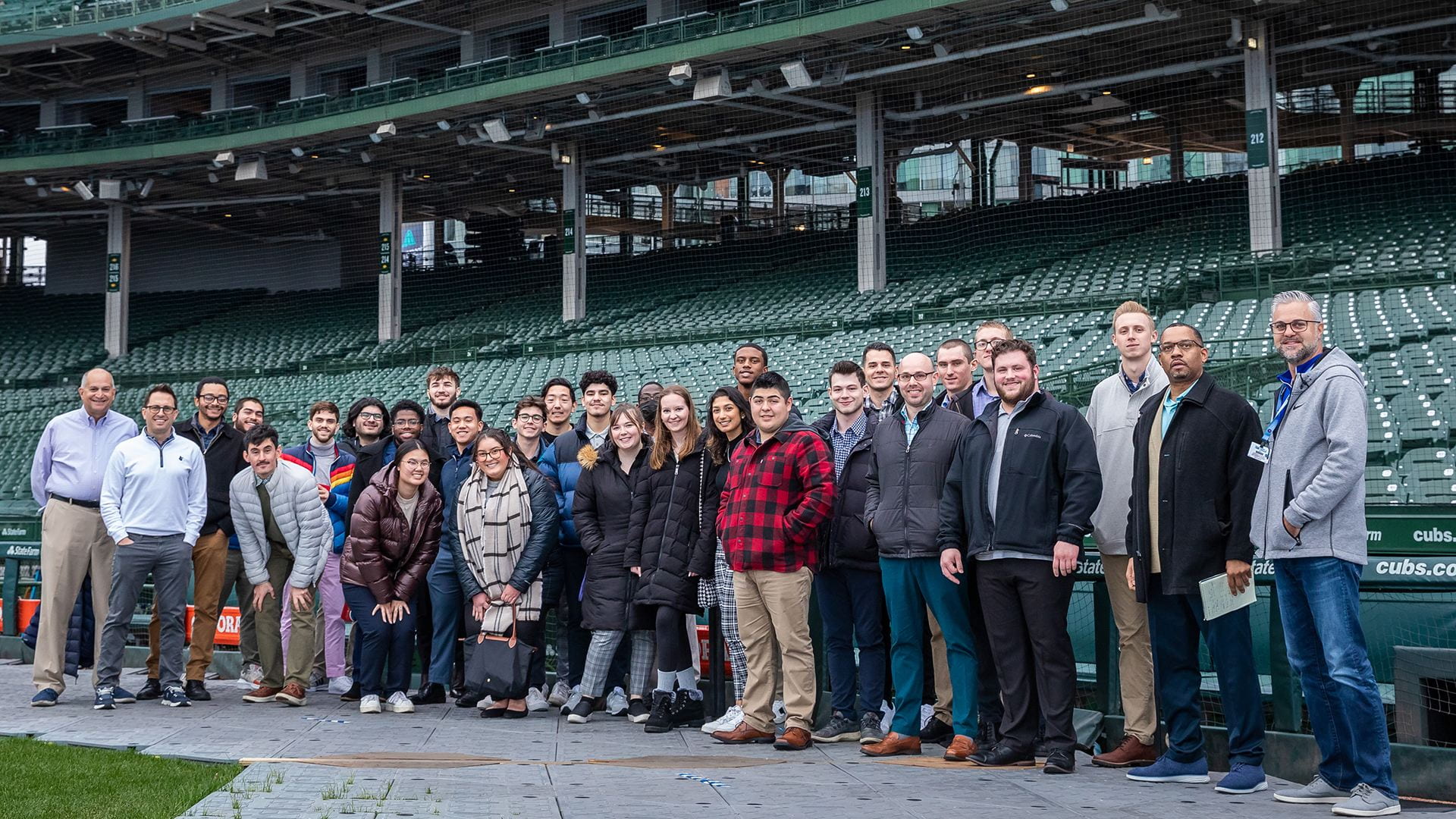To take a class with Andy Clark (MBA ’87) is to get a “master class” in networking – one that launches you straight into your career.

Director of Sports Business program and Senior Instructor Andy Clark.
Andy Clark is the director of the sports business program at DePaul’s Driehaus College of Business. In 2023, he was one of two faculty selected by graduating seniors in business to win the Lawrence W. Ryan Distinguished Teaching Award at Driehaus.
When he was his students’ age, he didn’t know a career like this existed.
He recalls one moment when it all came together.
It was a basketball game: DePaul vs. Northwestern. It was the early ’80s: the height of Ray Meyer’s tenure as DePaul men’s basketball head coach. The stadium was packed: a sea of blue on one side and purple on the other, Clark recalls.
“DePaul won on a last-second shot,” Clark says. “To be there for that — to be a small part of that — was amazing.”
At the time, Clark was an intern for DePaul Athletics, after graduating from Fordham University. It was a position he’d heard about through a friend from Fordham.
“A hundred bucks a week, a room in McCabe,” he recalls of the arrangement. The flight to Chicago, he says, was his first time on a plane.
The internship gave him a glimpse into what was possible at the nexus of management, marketing and the sports world he loved so much. After his internship, he got hired as the manager of DePaul Athletics ticket sales. Eventually, he decided to earn his MBA from DePaul.
Forty years and an extensive career in sports management and marketing later, Clark has returned to where he started.
“Making relationships and keeping them”
Getting work done, Clark says, is all about “making relationships and keeping them.” This is the central message he hopes to impart to his students.

Gridiron in the Classroom: Referee Tony Michalek helps Clark’s class make the right calls.
Clark has cultivated connections with an impressive roster of guest speakers. There’s an NFL referee and an NHL player agent. There’s an Olympic silver medalist who started a nonprofit to empower girls in swimming. There are DePaul alumni, many of them Clark’s former students, hailing from every corner of the sports world.
Clark has also forged partnerships with Chicago’s top sports organizations. He’s worked especially closely with the Chicago Cubs, where a number of alumni hold posts in senior leadership. Every so often, Cubs chairman Tom Ricketts makes an appearance to speak to Clark’s students.
Clark has two criteria for each guest speaker he invites: Can they keep students — and Clark — engaged? (He “never gets bored” of site visits, he says.) And can they discuss their career in a way that imparts lessons relevant to any field, not just sports business?
“What I like about teaching,” reflects Clark, “is being a connector: connecting experts to our students, so they can learn how their skills apply to the workplace.”
In this regard, taking a class with Andy Clark is like getting a master class in networking. He schools students in crafting thoughtful, well-researched questions for speakers. He teaches them how to dress for site visits (a suit and tie are no longer required). And as part of his final exam, he tasks each student with writing thank-you notes to three guest speakers — by hand.
From classroom to career
In Clark’s courses, students aren’t only learning from the sports business world, they’re also contributing to it by partnering with leading sports organizations to carry out real-world research.

Andy Clark’s classes visit where the action all happens.
Projects for the Chicago Cubs have included an analysis of their customer service and a study on their rollout of a mobile ordering platform.
“Knowing that the work we were doing was going to be useful right away was highly motivating,” says Kenzie Mocogni (BUS ’19), who worked on the Cubs customer service study. “Working with a real client reminded us that what we are learning in the classroom at DePaul is preparing us for the business world.”
The Cubs aren’t the only team with close ties to Clark and to DePaul.
“It’s been incredibly inspiring to see DePaul students come up with innovative, impactful ideas,” says Tony Rokita, a onetime DePaul student and the former director of alumni relations for the Chicago Bulls, regarding a project that worked on a Bulls community partnership in Chicago’s West Garfield Park neighborhood.
For Clark and his students, there’s a direct line between theory and practice and between classroom and career.
“I’m not a teacher by training,” he’s quick to say. “With most of the stuff I do, no one told me I had to do it this way. For me, teaching feels like an evolution of what I was doing before [in the business field].”
As Clark reflects on teaching, he says the best part has been seeing how students’ careers unfold, outside sports as much as within it.
“It’s almost more gratifying,” he says, “when I hear from former students who don’t work in sports that they apply things from my class to their jobs now. That’s what this is all about: helping students apply what they learn.”
Teaching has taught Clark a lot, too.
“Every day,” he says, “is an education in empathy.”
—
On the first day of his Introduction to Sports Management course, Clark has one question for his students. It’s perhaps the best summary of what Clark accomplishes in his courses — and how Driehaus overall approaches preparing students for their careers.
“When do you think your career in sports is going to start?” Clark asks.
Clark’s answer? “If you’re in this class, it already started.”